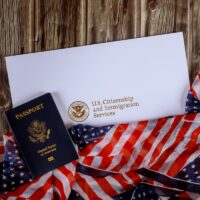Common Reasons for Denial of N-400

For many non-citizens working and living in the United States, naturalization is the ultimate goal. They hope to become full-fledged citizens, taking advantage of all of its benefits, rather than staying in the country with a green card and maintaining citizenship elsewhere. To become a citizen after holding a green card, the noncitizen must submit an N-400 application. There are many reasons why an N-400 application may be denied, however. Continue reading for a discussion of how and why N-400 applications are commonly denied, and reach out to a dedicated New York immigration lawyer for help with deportation defense, green card, citizenship, visa, or other immigration status issues.
What is the N-400?
The N-400 is the Application for Naturalization. It’s the final step for green card holders (lawful permanent residents or “LPRs”) ready to apply for U.S. citizenship after meeting all other eligibility requirements. Typically, the applicant must be at least 18 years old and have had a green card for at least five years (or for at least three years if married to a U.S. citizen). Other requirements apply if the applicant is relying on qualifying military service.
Why Are LPRs Denied Naturalization
The N-400, like all other aspects of the American immigration system, is complex and riddled with pitfalls for noncitizens. N-400 applications are commonly denied for a variety of reasons. Some of the more common reasons for N-400 denial include the following:
- Failing the English test. Applicants must be able to demonstrate their knowledge of the English language. Applicants can reattempt the test once, but their application will be denied if they fail a second time.
- Failing the U.S. history and government test. Applicants must correctly answer at least six questions on a ten-question civics test to be naturalized, drawn from a list of 100 potential questions. The application will be denied if the applicant fails the test twice.
- Lack of “good moral character.” USCIS will conduct a criminal history check of the applicant, and any arrests or convictions can delay or prohibit naturalization. Some minor offenses will lead to a temporary bar of citizenship, while a conviction for other crimes (including violent crimes, drug offenses, terrorist or hate crimes, or any conviction leading to more than 180 days’ imprisonment) can lead to a longer-term or permanent denial.
- Failing the physical presence requirement. Applicants must have resided physically within the United States for at least 30 months of the previous five years to apply for naturalization.
- Failure to pay taxes or other financial obligations. Owing back taxes can serve as grounds for denial of an N-400 application. Applications may also be denied if the applicant has failed to pay child support or other court-ordered obligations.
- Fraudulent application. Any misstatement to the USCIS or in the application can lead to denial. Some USCIS officials will overreact to even small errors or omissions, believing they undermine the trustworthiness of the whole application. Be careful and thorough to avoid such a denial.
- Divorce. In order to apply for citizenship within three years of obtaining a green card, the applicant must be married to a U.S. citizen. If the parties have already divorced, the application can be denied.
If you are seeking asylum, protected status, citizenship or permanent residence status for yourself or a loved one, or if you are facing any issues with your immigration status, contact the experienced and compassionate Queens immigration lawyers Gladstein & Messinger at 718-793-7800 or toll-free at 800-339-0535.

